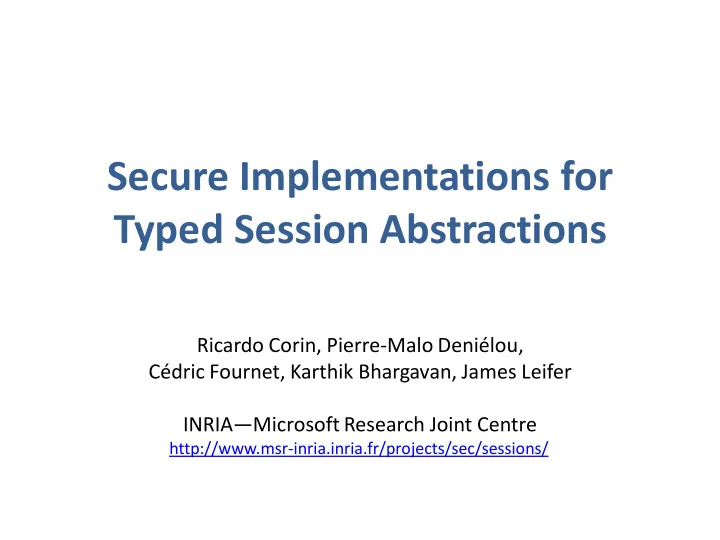

Secure Implementations for Typed Session Abstractions Ricardo Corin, Pierre-Malo Deniélou, Cédric Fournet, Karthik Bhargavan, James Leifer INRIA — Microsoft Research Joint Centre http://www.msr-inria.inria.fr/projects/sec/sessions/
Distributed applications • How to program networked independent sites? – Each site has its own code & security concerns – Sites may interact, but they do not trust one another • Communication abstractions can help – Hide implementation details (message format, routing,…) – Basic communication patterns, C S e.g. RPCs or private channels – Sessions, O (aka protocols, C S or contracts, S O or workflows)
Session types • Active area for distributed programming – From pi calculus to web services, operating systems, ... – General strategy: enforce protocol compliance by typing If all programs are well-typed, session runs follow their spec • Secure implementation? – Needs protection against network attackers (e.g. SSL) – Needs protection from partially-trusted remote parties – Defensive implementations must monitor one another, giving up most benefits of abstraction
Compiling session types to protocols • We extend F# (a variant of ML) with session types that express message flows Well-typed programs always play their roles • We compile session type declarations to crypto protocols that shield our programs from any coalitions of remote peers Remote sites can be assumed to play their roles (without trusting their code)
Compiling session types to protocols Networking & Symbolic Concrete Cryptography Crypto Crypto A compiler from sessions to F# formally verified Session Session code code (F#) types Symbolic Model [BFGT’06] Application code Application code F# compiler An extension of F# F+S concrete code with session types (.NET runtime)
Expressing sessions • Terminology: – Roles: represent session participants – Principals: instantiate roles at runtime – Messages: consist of labels and payloads • Two ways to represent sessions: – As a graph: useful for global reasoning on sessions – As a collection of local roles: useful for the language semantics and implementation – The two representations are interconvertible
Example Accept Confirm C S O Offer Request Contract Change S C O Abort C Reject O “Customer C negotiates delivery of an item with a store S; the transaction is registered by an officer O.”
A small session language
Our formal subset of F# with sessions F + S
F+S semantics • The source F+S semantics models a centralized session monitor – layered semantics roles sessions expressions (…) configurations (…) – constitutes our global specification for sessions – does not exist in F, our target language
Global session integrity • For any run, – for any choice of good and bad principals, for any session: – there exists a valid path in the session graph – that is consistent with all the messages sent and received by the good principals • Session integrity holds by design in F+S – Generalizes correspondence properties (=path properties) • Our compiler generates cryptographic code to enforce this in F
Global session integrity • Examples that could break integrity: 2. Only possible after C sent accept (remote party attack) 1. Only possible once (network attack) Accept Confirm C S O Offer Request Contract Change S C O Abort Reject C O
Implementability conditions • Some sessions are always vulnerable C Offer C Request S O Reject • We detect them and rule them out – They can be turned into safe sessions but only with extra messages
Security protocol • We combine standard mechanisms – X509 digital signatures – Logical timestamps for loop control – Anti-replay cache • Per principal, based on session identifier Hash(S, a, N) + role • Which evidence to sign & forward?
Forwarding history • Complete history – Every sender countersigns the whole history so far – Every receiver checks signatures and simulates the history vs. session spec – Large overhead (unbounded crypto processing) • We can do much better
Visibility • Visibility = minimum information needed to update local role – The sequence of last labels from all peers since last message send – Any less information would break integrity • Can be computed statically from the session graph – More work for the compiler = less runtime tests – This actually simplifies formal proofs! Visible: Accept-Confirm Visible: 1. Request-Contract 2. Change Accept Confirm C S O Offer Request Contract Change S C O Abort Reject C O
Our session compiler • Generates interface (types for all messages) • Generates specific sending and receiving code for each visible sequence – Checks exactly what is expected – Zero dynamic graph computation • 5000 lines in F# + dual F# libraries
Dual libraries *BFGT’06+ • Crypto library: • Principals library: • Dual implementations – Symbolic: using algebraic datatypes and type abstraction – Concrete: using actual system (.NET) operations
Integrity theorems • Configuration = Libraries + Session Declarations + User Code + Opponent Code C Offer counter-example if C Request S we allowed session forks: Reject O
Discussion • Session types are an active area of study – we address their secure implementation • Protocol verification: – We verify our implementation code — not just a simplified model – Our results hold for any number of (concurrent) sessions – Even for a single session, this is beyond automated verification tools (loops and branching) – Crypto is Dolev-Yao but not far from computational model – Integrity, not liveness (so no progress or global termination) • Related work on secure implementations of process calculi, on automated protocol transformations
Conclusion • Cryptographic protocols can sometimes be derived (and verified) from application security requirements – Strong, simple security model – Safer, more efficient than ad hoc design & code • Future work? – Data binding and correlation – More dynamic principals – Secure marshalling for richer types • Try it out today! http://www.msr-inria.inria.fr/projects/sec/sessions/
Recommend
More recommend